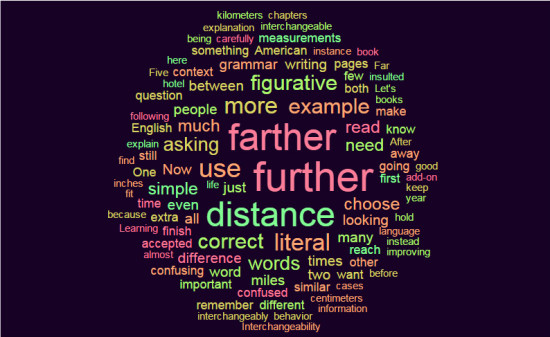Further Away versus Farther Away

For example, the question whether to use “further away” or “farther away” can be confusing. They look very similar, and their meanings are similar too. When we’re talking, few people would even notice the difference, but when we’re writing, we need to be more precise and choose our words carefully. How will we know when to use “further” and when to use “farther?” Luckily, there’s a very simple way to work it out when you proofread your writing. It’s the difference between literal distance and figurative distance.
Distances can be literal or figurative
When we refer to distance, it can be either literal or figurative. For example:
“How much farther will we have to drive to reach our hotel?”
In this example, the person asking the question is looking for a literal distance. They want to know how many miles they will have to travel to reach their destination. “Farther” is completely correct in this context.
In the following example, our distance is figurative:
“Would you like me to explain this further?”
Obviously, the answer here can’t be “Five miles” because we aren’t looking at a literal distance.
The good news is there’s a simple and useful trick to remembering the difference. To make your life easier, you can remember the correct use for “farther” by looking at the first syllable, “Far.” Now think of all the distance measurements. There are miles, kilometers, centimeters, inches and so on. Would you associate these measurements with what you are going to say? If so, then “farther” is the word you should be choosing in order to be 100% correct.
Now consider “further” as being an “add-on”:
“You can have a further $5.”
“It will be a further year before you finish your studies.”
“I was further insulted by her rude behavior on Sunday.”
It tells you that something extra is going to be added.
Interchangeability: just to make you more confused
Now that we have a clear explanation of when to use the word “farther” rather than “further” it’s time to muddy the waters a little. Although you shouldn’t use “farther” at times when “further” is the more appropriate choice, there are times when you can use “further” instead of “farther.” There are even some who advise you to choose “further” when in doubt.
People have been using these two words interchangeably for a long time, and in other parts of the world where English is spoken, “further” is used much more often, while few people use “farther” at all. But if you want to fit in with accepted modern American grammar, it’s important to remember the simple distinction between the literal distance “farther” and the figurative distance “further.” If you are writing a report or an essay, you need to choose the correct word, and the usages we’ve just discussed are accepted as correct in both the Chicago Manual of Style and the AP Stylebook.
But there are still cases in American grammar in which we will find that the two words are interchangeable. For instance:
“How much farther do you have to read?” and “How much further do you have to read?” would both be correct. After all, you could be asking someone how many pages they still need to read to finish the book, or you could be asking if they will have to read more books or more chapters to get the information they need. In the first example, you’re asking for a literal distance in the number of pages. In the second example, you’re asking for a figurative distance. As with so many other grammar rules, context is very important.
Let’s keep it simple. If reading this has made you more confused than ever, then just hold onto this thought:
“Farther” is a distance and “further” is something extra. How easy is that?
